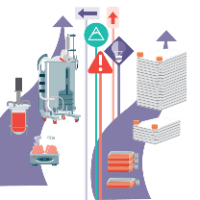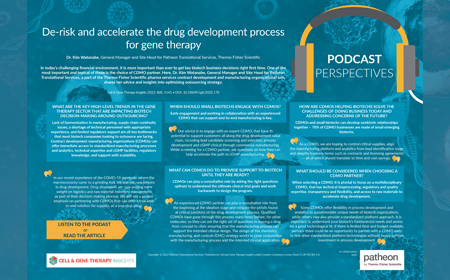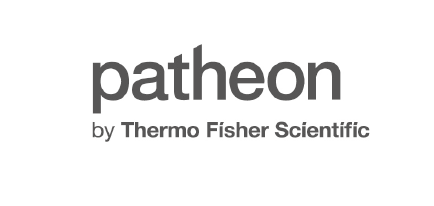De-risk & accelerate the drug development process for gene therapy
Cell & Gene Therapy Insights 2022; 8(8), 1129–1133
DOI: 10.18609/cgti.2022.166
David McCall, Editor, Cell & Gene Therapy Insights, talks to Kim Watanabe, General Manager & Site Head, Patheon Translational Services, ThermoFisher Scientific
Read the the interview below or listen to the Podcast here.
If you enjoyed this episode, you can listen to all episodes from The BioInsights Podcast wherever you normally get your podcasts.
Follow the Podcast to make sure you don't miss the next episode.
What are some key high-level trends in the gene therapy sector that are impacting biotech decision-making around outsourcing?
KW: From my perspective, there are three main themes: Speed, Simplicity, and Resilience.
There are a significant number of advanced therapy sponsors who are small- to mid-sized startup biotech companies. Unlike big pharma companies, they are challenged by limited capital, tight timelines, and an incomplete understanding of what it means to establish a functioning, good manufacturing practice (cGMP)-compliant operation.
We live in an impatient world now more than ever and with the increasing degree of competition in the market for funding, investors in particular do not have a lot of patience. They want to see an almost immediate return on their investments. This means there is not much time to build a facility, especially when facing construction material shortages from the impact of the COVID-19 pandemic. Most importantly, it takes time to outfit the facility with the right group of talent. As a result, the need to outsource to experienced contract development manufacturing organizations (CDMOs) with the right set of expertise will continue to grow for small companies seeking to gain that maximal speed to commercialization, and ultimately, a faster path to their payday.
Another trend I have seen is the greater demand for supply chain simplicity and resilience to overcome current raw material bottlenecks. There are inherent workflow complexities in manufacturing cell and gene therapy products, as we are dealing with different vendors to procure hundreds of raw materials, many of which are unfortunately single source. There is a consistent need to find areas to improve the supply chain and to build a more streamlined process.
We, as a sector, learned a lot from our recent experience of the COVID-19 pandemic, where the macro economy came to a grinding halt. Drug developers are now putting more weight on logistics and raw material inventory management as part of their decision-making process. Consequently, we will see a greater emphasis on partnering with CDMOs that can offer a true end-to-end solution for support, as a one-stop-shop.
When should small biotechs engage with CDMOs?
KW: The earlier the engagement with an experienced CDMO, the better. There is a common misconception that small biotechs and drug developers cannot afford to engage with CDMOs at early stages of development due to enormous costs. There is an inclination from drug developers to wait until their lead candidate molecule is fully defined, and they have a good mapping of their chemistry, manufacturing, and controls (CMC) strategy.
Unrealistic expectations from both the drug developers and an inexperienced CDMO partner in terms of tech transfer readiness, documentation availability, intellectual property access, and timelines, all ultimately impact cost. They also hinder patients gaining access to treatments as early as possible.
Our advice is to engage with an expert CDMO that has a broad range of capabilities to support its clients at all stages of clinical development. That means starting from the discovery/proof-of-concept stage, way before preclinical development. The CDMO can then offer support all the way through commercial manufacturing based on its vast experience. While screening for a CDMO partner, ask questions about how they can help de-risk tech transfer whilst ensuring an accelerated path to cGMP manufacturing.
What can CDMOs do to provide bits of support to biotechs until they are ready?
KW: An experienced CDMO partner can play a consultative role from the beginning, at the ideation stage. Qualified CDMOs have gone through this process many times before for other molecules, so they can ask the right set of questions to stem conversations with innovators and ensure they consider the important developmental aspects as part of their product design.
After all, we cannot design the CMC strategy without first understanding the intended clinical applications. The design of your clinical trials and the design of your manufacturing process have to work hand-in-hand. We need to work backwards to understand the cohort size, the tissue target, the route of administration, the filled volume, the container type, etc. Ultimately, this will all help to shape the decisions surrounding which manufacturing process to use.
If the CDMO is someone like Patheon, for instance, we can also provide our partners with early access to scaled-down cGMP processes for screening molecules before a final candidate is selected.
In summary, if a drug developer is undecided about whether to outsource, or is certain if they will need to leverage a CDMO in the development stage, then start the dialogue as early as possible–ideally, before the preclinical development so that a fit-for-purpose process may be built from the beginning.
How are CDMOs helping biotechs solve the challenges of doing business today and also addressing their concerns about the future?
KW: I can share with you what we are doing here at Thermo Fisher Scientific. Our approach is to provide a comprehensive end-to-end solution under one ecosystem. We are the manufacturer of many critical raw materials used for viral vector manufacturing, and through our newly-launched Patheon Translational Services, we provide molecular biology and viral vector services to generate high-quality, small-scale materials to support early proof-of-concept studies.
Once our partners are ready for pre-clinical development and later stages, we offer process development (PD) and cGMP manufacturing through our pharma services. As I mentioned earlier, you cannot separate clinical trial design from manufacturing, and our organization is in a unique position to also cover clinical research services through our Pharmaceutical Product Development (PPD) team. We also have a robust logistics team to support the transport, storing, and handling of specialized biological samples.
In short, as a CDMO, we help de-risk the tech transfer process, control critical supplies, and simplify business terms such as contracts and licensing agreements–all of which should translate to time and cost savings.
What should be considered when choosing a CDMO partner?
KW: There are so many considerations, including the level of transparency and clarity of the CDMO’s offering. Some CDMOs offer flexibility to accommodate unique needs, whilst others only provide their platform processes. It is important to understand your biotech’s fundamental needs and assess for a good technological fit. If there is limited time and budget available, perhaps there could be an opportunity to partner with a CDMO early to test drive platform technologies without heavy upfront investment.
At Thermo Fisher, we offer our partners access to process technologies and analytics deployed in the cGMP setting, in a scaled down environment. This supports Customers who are going through lead candidate selection but who are not quite ready for the PD and cGMP manufacturing stages yet through our Translational Services offering. There is no commitment to a cGMP contract at this stage, which is important for Customers who want to engage early to evaluate drug candidates and perform proof-of-concept studies.
Another factor to consider is expertise. During your screening process for the right partner, listen to how often the subject of facility availability comes up, rather than other key attributes such as well-trained, talented operators. Do they place emphasis on their team? Ultimately, the operators are going to be supporting your programs. Is there an experienced team of biologists, virologists, bioprocessing engineers, project managers, and clinicians in the organization? Overall, the key is to think on a multidimensional level during your evaluation process.
Affiliation
Kim Watanabe, PhD
General Manager & Site Head,
Patheon Translational Services,
Thermo Fisher Scientific
If you enjoyed this podcast, have a look at the poster on the same topic
Authorship & Conflict of Interest
Contributions: All named authors take responsibility for the integrity of the work as a whole, and have given their approval for this version to be published.
Acknowledgements: None.
Disclosure and potential conflicts of interest: The author has no conflicts of interest.
Funding declaration: The author received no financial support for the research, authorship and/or publication of this article.
Article & copyright information
Copyright: Published by Cell and Gene Therapy Insights under Creative Commons License Deed CC BY NC ND 4.0 which allows anyone to copy, distribute, and transmit the article provided it is properly attributed in the manner specified below. No commercial use without permission.
Attribution: Copyright © 2022 ThermoFisher Scientific. Published by Cell and Gene Therapy Insights under Creative Commons License Deed CC BY NC ND 4.0.
Article source: This article is based on a Podcast which took place on Aug 18 2022.
Podcast conducted on: Aug 18 2022; Revised manuscript received: Sep 23 2022; Publication date: Sep 29 2022.



